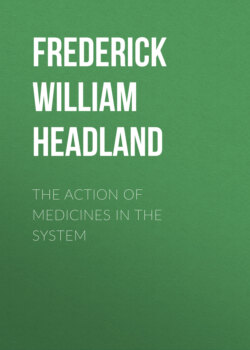The Action of Medicines in the System

Реклама. ООО «ЛитРес», ИНН: 7719571260.
Оглавление
Frederick William Headland. The Action of Medicines in the System
The Action of Medicines in the System
Table of Contents
A CLASSIFICATION OF MEDICINES WHICH ACT AFTER ENTERING INTO THE BLOOD, ACCORDING TO THEIR SUPPOSED MODES OF OPERATION
CHAPTER I
INTRODUCTORY REMARKS
CHAPTER II
ON SOME OF THE MORE IMPORTANT CLASSIFICATIONS OF MEDICINES, AND OPINIONS OF AUTHORS RESPECTING THEIR ACTIONS
I. Opinions concerning the ultimate Effect of Medicines, and Classifications founded on this
II. Opinions concerning the Local Tendency of Medicines, and Classifications founded upon this
III. Opinions concerning the Mode of Operation of Medicines, and Classifications founded on this
CHAPTER III
ON THE GENERAL MODES OF ACTION OF THERAPEUTIC AGENTS INTRODUCED INTO THE STOMACH
Prop. I.—That the great majority of medicines must obtain entry into the blood, or internal fluids of the body, before their action can be manifested
Prop. II.—That the great majority of medicines are capable of solution in the gastric or intestinal secretions, and pass without material change, by a process of absorption, through the coats of the stomach and intestines, to enter the capillaries of the Portal system of veins
Prop. III.—That those medicines which are completely insoluble in water, and in the gastric and intestinal juices, cannot gain entrance into the circulation
Prop. IV.—That some few remedial agents act locally on the mucous surface, either before absorption, or without being absorbed at all. That they are chiefly as follow:—
Prop. V.—That the medicine, when in the blood, must permeate the mass of the circulation, so far as may be required to reach the parts on which it tends to act
Prop. VI.—That while in the blood, the medicine may undergo change, which in some cases may, in others may not, affect its influence. That these changes may be—
Prop. VII.—That a first class of medicines, called Hæmatics, act while in the blood, which they influence. That their action is permanent
RESTORATIVES
Ord. I. Aliments
Ord. II. Acids
Ord. III. Alkalies
Ord. IV. Tonics
Ord. V. Chalybeates
Ord. VI. Solvents
CATALYTICS
Ord. I. Antiphlogistics
Ord. II. Antisyphilitics
Ord. III. Antiscrofulics
Ord. IV. Antiarthritics
Ord. V. Antiscorbutics
Ord. VI. Antiperiodics
Ord. VII. Anticonvulsives
Ord. VIII. Antisquamics
Prop. VIII.—That a second class of medicines, called Neurotics, act by passing from the blood to the nerves or nerve-centres, which they influence
STIMULANTS
Ord. I. General Stimulants
Ord. II. Special Stimulants
NARCOTICS
Ord. I. Inebriantia
Ord. II. Soporifics
Ord. III. Deliriants
SEDATIVES
Ord. I. General Sedatives
Ord. II. Special Sedatives
Prop. IX.—That a third class of medicines, called Astringents, act by passing from the blood to muscular fibre, which they excite to contraction
Ord. I. Mineral Astringents
Ord. II. Vegetable Astringents
Prop. X.—That a fourth class of medicines, called Eliminatives, act by passing out of the blood through the glands, which they excite to the performance of their functions
Ord I. Sialagogues.[45]
Ord. II. Expectorants
Ord. III. Cathartics
Ord. IV. Cholagoques
Ord. V. Diaphoretics
Ord. VI. Diuretics
CHAPTER IV
GENERAL INDEX
FOOTNOTES:
Отрывок из книги
Frederick William Headland
Or, on the mode in which therapeutic agents introduced into the stomach produce their peculiar effects on the animal economy
.....
The first of these questions is the simplest, and may be answered from experience. We know that one medicine is a purgative, because it opens the bowels. We call another an alterative, because the manifestations of vital action are somewhat different after its use from what they were before. The last question is the most difficult to answer, because it involves the exact mode in which a medicine first behaves itself, so as to bring about its recognised operation.
Though the arrangements and theories of authors have generally taken into account all three of these questions, yet they have usually given greater prominence to one or other of them. And according to this their predominant idea, I will take the liberty of grouping them into three schools for the sake of convenience; considering, first, some theories and therapeutical arrangements which are based upon the ultimate effect of medicines; secondly, some that depend upon their local tendencies; and thirdly, some others that concern their mode of operation.
.....